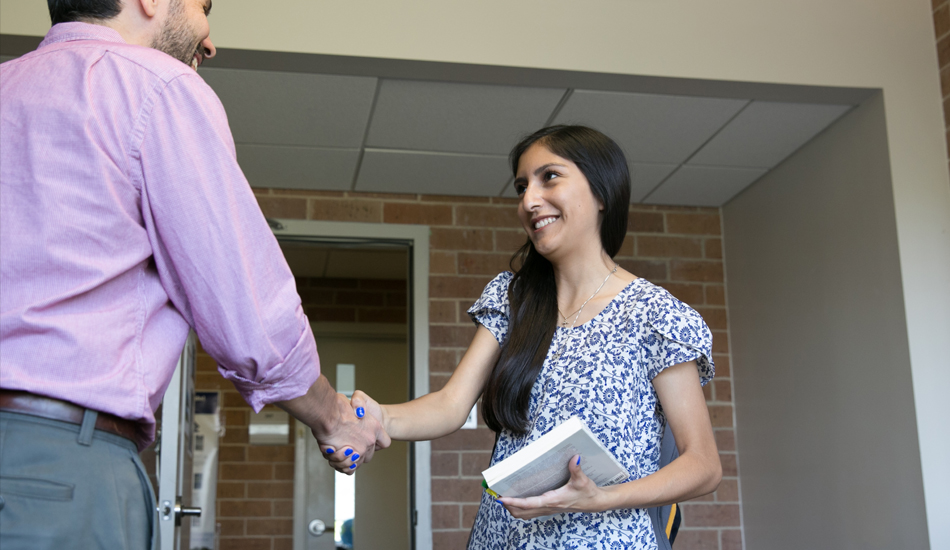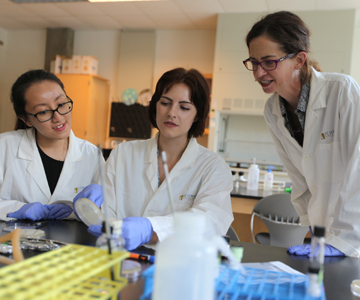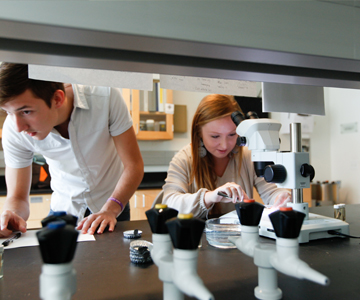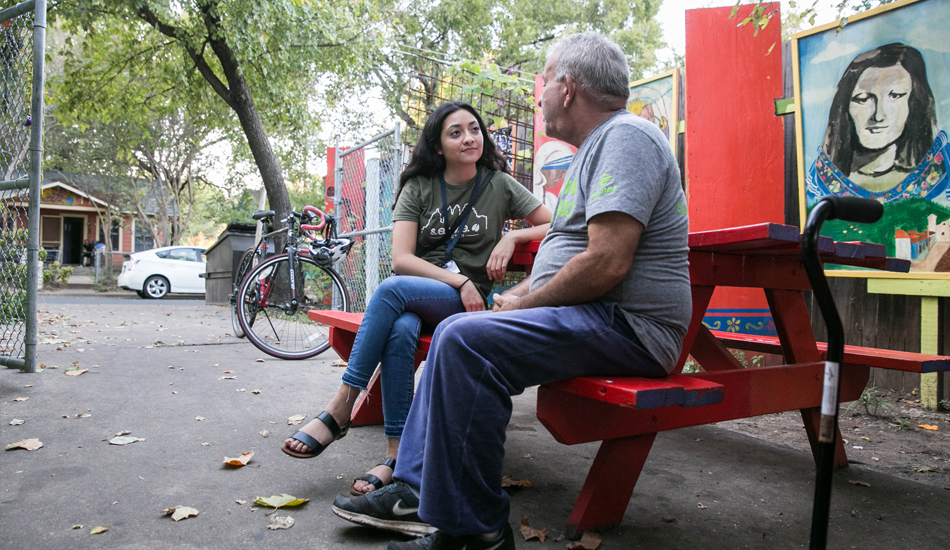The journey to medical school is long and challenging, but you don’t have to do it alone. From the moment you register for your first class at St. Edward’s, you’ll have the support of an office specializing in the health professions and professors who will become your mentors and advocates. And while you’ll get an excellent science education, you’ll also develop the leadership, compassion and critical-thinking skills that today’s medical schools are looking for.
You’ll get personal, individualized coaching, even before your freshman year begins.
“I know students from the time they set foot on campus until the time they get accepted into a program,” explains Jason De La Rosa, associate director of pre-health professions. When you attend freshman orientation, you’ll meet with him to talk about your career goals and what it takes to get into medical school. Together, you’ll map out the courses, service work and experiential learning you’ll need to accrue by the time you apply. Then you’ll keep in regular contact all four years and beyond as you progress toward your goal.

You’ll get the kind of well-rounded education medical schools want to see.
To get into medical school, you’ll need a strong GPA, good Medical College Admission Test (MCAT) scores and a solid performance in upper-level biology and chemistry courses. But that’s not all that matters. In the past 5 to 7 years, medical school admission committees have shifted to a more holistic review process that also considers research, experience in the health professions, commitment to community service, and people skills.
De La Rosa says the shift happened because medical schools realized they were turning out smart doctors, but not all of them understood how to relate to patients. “They’re really looking to enhance skills like empathy, compassion and understanding of the human perspective,” he says. Even if you major in science at St. Edward’s, you’ll still take courses like philosophy and psychology as part of your general education requirements. Plus, the university’s relatively small size means you can easily get plugged in to opportunities that expand your perspective, like research, internships and service.
Those experiences really matter, says Margaret Whitney ’07, a practicing ob-gyn who earned her medical degree from the University of Texas Health Science Center at San Antonio and now teaches at the University of Texas at Austin Dell Medical School. “There’s a lot more emphasis on how you’ll take care of people,” she says. “You have to be able to think critically about systems and be able to troubleshoot. You have to think about the patient’s social situation. You have to build trust. If you’re going to take care of humans, you have to be well-rounded; you can’t just be a Brainiac.”
You’ll take three classes specifically designed for pre-med students.
As a freshman, you’ll take the First-Year Seminar in Pre-Health Professions, where you’ll learn from guest speakers who are healthcare practitioners. You’ll conduct an informational interview with a local doctor and possibly shadow him or her at work.
As a junior or senior, you’ll take Navigating the Health Application Process, where you’ll prepare your medical school application and write your personal statement. You’ll also choose which schools you should apply to, based on their mission, values and curricula. “By that point I’ve known them for four years, and I can give them suggestions — or if there’s a big-name school they love, I can tell them what the student culture is like or connect them with a student in the program,” De La Rosa says.
You’ll also take a Kaplan MCAT prep course to get ready for the test.


You’ll have the support of a team of professors.
Before you apply to medical school, you’ll apply to the Health Professions Advisory Committee at St. Edward’s. The committee is made of professors in biology, chemistry, behavioral neuroscience, and philosophy and ethics — along with De La Rosa — and interviews each student who meets its criteria. The committee writes a letter of evaluation that gives medical schools a complete picture of the student’s scientific and ethical aptitude, and interpersonal skills. “That letter helps set students apart because you essentially have multiple voices speaking on behalf of that student,” De La Rosa says.
The proof is in the numbers.
In the past two years, every qualified student who completed the pre-medical advising program at St. Edward’s was accepted to medical school. So far this year, several students have been accepted to multiple programs.
And if you change your mind, you’ve got options.
If you realize medicine isn’t the right career for you, you’ll have help finding a better fit. “That’s one of the joys of being a liberal arts school,” says De La Rosa. “Students have really good academic advisors and faculty advisors who can help them better understand where their skills and passion lie.”

You’ll get to tour medical schools as part of the program.
St. Edward’s offers up to 30 pre-health professions programs each year. Students travel as a group to medical schools around the state, where they meet current students and learn how to strengthen their applications.
You’ll have experiences outside the classroom that make you a stronger candidate.
The ability to work with people from all backgrounds is crucial to being a good physician, Whitney says. St. Edward’s offers service programs and travel opportunities that will help expand your perspective.
Whitney says one of her most influential experiences at St. Edward’s was an “urban plunge” trip to the South Side of Chicago, where she and her fellow students met with community members whose lives were very different from their own. “I had never engaged with anyone who was personally impacted by profound social injustices in such a frank manner,” she says. “It had a profound impact on the way I approach difficult conversations, and it has definitely helped me to be a better physician. To me, that’s why schools are looking for people who have done other things besides excel at science. When you have had experiences with different types of people, you can be a more understanding person that can connect with people, rather than just make a diagnosis."